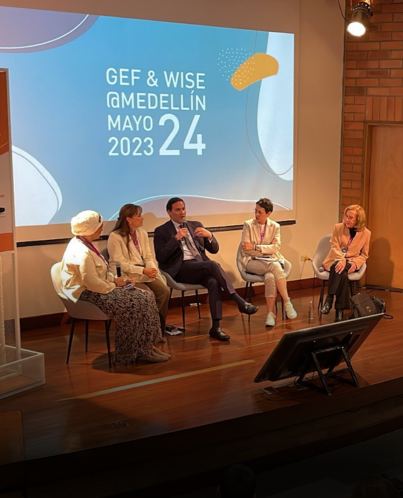Why The Future of Education is Personalised
Personalised education could revolutionise the traditional education system by tailoring learning experiences to students, and new and emerging educational technology (edtech) is already playing a vital role. Aldenham Education Group’s Managing Partner, Shahram Hashemi, has years of experience in the education sector, and last month he was invited by the globally-renowned non-profit Qatar Foundation to speak at the Global Education Forum & WISE @ Medellin Conference to shed some light on the future of education. The benefits of personalised learning include increased accessibility and a boost in engagement, but there are still challenges such as data privacy and an increased workload for teachers. By harnessing the power of edtech, we’re paving the way for a more effective and student-centred educational experience.
The impact of edtech
Education has changed drastically over the past few years, and thanks to technological innovations, it’s evolving fast. AI in particular has come on in leaps and bounds, and has transformed the education sector. Despite school districts around the world banning AI tools like ChatGPT, AI has tremendous potential and could help personalise education. Some countries, like the UAE, have already begun working on guidelines and policies to help AI tools elevate the education system. AI algorithms analyse students’ data – everything from their grades and exam results to their learning styles and preferences. This data can be used to help students – algorithms can recognise pupils’ strengths and weaknesses, and teachers can then use this information to create personalised curriculums, or lesson plans tailored to each pupil.
VR can offer students a more interactive learning experience, and improve student engagement. It can be used in subjects like science, history, and geography, taking students back in time or to different parts of the world without leaving the classroom, giving them unique perspectives that they wouldn’t have otherwise have had. Pilots and medical professionals have been using VR technology to train for years, but it’s only recently that the technology has entered the classroom. VR technology can even incorporate multi-sensory elements to give students visual, auditory, and even tactile feedback. Not every student learns the same way – while some would learn more from books, others benefit from being fully immersed in a virtual world.
Benefits of personalised learning
By breaking down barriers and providing students with equal opportunities, personalised learning makes education more accessible. Teachers can tailor their lessons to students’ individual needs and preferences, meaning students learn at their own pace. Personalised learning also allows for targeted support and intervention, ensuring students receive the assistance they need. This approach will help to bridge the educational inequality gap, which only worsened during the COVID-19 pandemic. According to a UNICEF report from last year, 147 million children had missed more than half of their in-person schooling because of the pandemic – amounting to 2 trillion hours lost. A more personalised approach to education would give underserved communities and students with special needs a more rounded experience.
The traditional “one-size-fits-all” approach to education can fail to meet students’ diverse needs. Taking a more customised learning experience empowers students – they don’t have to hurry through subjects they find challenging, or waste time on topics they already understand. By giving students content specifically tailored towards them, teachers enhance students’ comprehension and knowledge retention skills. Individualised feedback also gives students more guidance, helping them track their progress and address areas that need improvement. This way, teachers foster higher levels of student engagement, helping students to feel more connected to their education journey.
Challenges and considerations
While personalised learning holds immense promise, it also presents a number of challenges – particularly for teachers. Creating personalised curriculums, lesson plans, and assessments for each one of their students can be time-consuming and demanding. A YouGov survey revealed that 87% of teachers already had issues related to workload pressures. In order to fully harness the benefits of personalised learning, educators require adequate training and support. Investing in professional development programs, and providing educators with the necessary resources and tools, are essential steps for governments and private education companies, if they want to ensure the success of their personalised learning approaches.
Since personalised learning relies heavily on the collection and analysis of student data, there are concerns and ethical considerations over data privacy. Safeguarding student data is of utmost importance to protect their privacy and maintain trust, particularly with cyber crime on the rise. Last year in the UK, 41% of primary schools surveyed reported they’d suffered a data breach or a cyber attack. It’s important for educational institutions to establish strict data privacy policies to protect students, and to ensure responsible use of edtech tools like AI and VR.
Aldenham’s approach to education
At Aldenham Education Group’s schools, including Aldenham School in the UK and Aldenham Prep Riyadh in Saudi Arabia, we’ve embraced a personalised learning approach. We’ve recognised that learning needs to be enjoyable, engaging, and (more importantly) fun, especially for younger children. Our approach to learning ensures that all pupils learn at their own pace, and according to their own styles. We’ve also embraced modern technology wherever we can, especially in the classroom. Tools such as interactive screens, computers, and state-of-the-art VR systems ensure we offer our pupils a learning experience that’s adaptable and flexible.
Personalised learning makes learning more immersive for students, increasing their engagement and improving their academic performance. As Shahram Hashemi explained while on stage at the Global Education Forum & WISE @ Medellin Conference, “With this technology, we can make sure that each child gets the needs that they require. We can customise the education and support the kids that are behind.” He also shared that AEG has begun working closely with top-tier consulting firms, to develop a strategy on how we can get more of these edtech technologies into our schools, and make our learning more effective.
Personalised learning holds immense potential, and is already beginning to reshape the future of education. By leveraging the power of edtech, we can create inclusive, student-centred learning environments that cater to the diverse needs of today’s pupils. Educators, policymakers, and edtech developers must work together to ensure education is as inclusive and effective as possible. By investing in a personalised learning approach, schools invest in the future of students, empowering them to thrive in an ever-changing world. To find out more about how AEG prepares pupils for life after graduation, visit Aldenham’s website.


